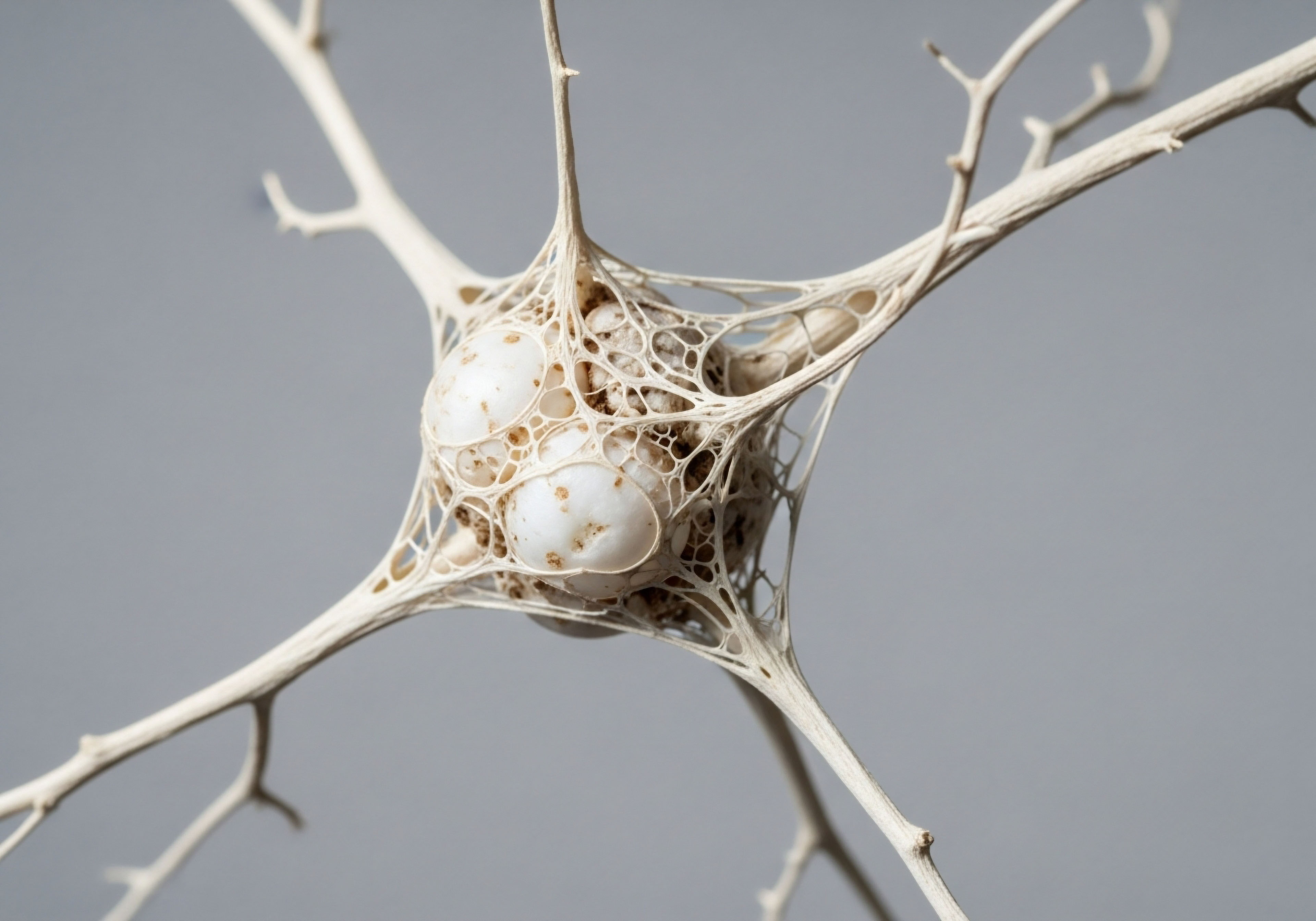The endocrine system is the master regulator of human physiology, orchestrating virtually every critical bodily function. It is a complex network of glands that produce and secrete hormones ∞ chemical messengers that travel through the bloodstream to target cells, dictating everything from metabolism and energy levels to mood, reproduction, growth, and our very response to stress. To optimize performance, vitality, and longevity, a deep understanding and strategic mastery of this intricate system are paramount. This guide illuminates the ‘Why,’ ‘How,’ and ‘When’ of reclaiming your edge through endocrine mastery.


The Internal Symphony of Peak Performance
The imperative for endocrine mastery stems from the fundamental truth that hormones are the architects of our biological experience. They are not merely chemical signals; they are the conductors of our internal symphony, dictating the tempo of our energy, the clarity of our thoughts, the resilience of our bodies, and the depth of our vitality. Without their precise calibration, optimal function remains an elusive aspiration.

Hormonal Foundations of Unrivaled Vitality
At its core, the endocrine system ensures homeostasis ∞ the stable internal environment necessary for life. However, its influence extends far beyond mere survival. Hormones are intrinsically linked to our capacity for peak performance and sustained well-being.
Consider the role of testosterone, often associated with male vitality, but crucial for both sexes in maintaining muscle mass, bone density, energy, libido, and cognitive function. Declines, whether age-related or due to other factors, are not just an inevitable consequence of aging but a signal of systemic imbalance that impacts drive and physical capability.
Estrogen, similarly, is far more than a reproductive hormone. It plays a vital role in cardiovascular health, bone integrity, skin elasticity, and cognitive function, particularly in women. Its decline during menopause can usher in a cascade of symptoms that diminish quality of life, affecting mood, sleep, and energy levels. Progesterone offers mood-stabilizing effects and is essential for reproductive health, but its influence extends to neurological function and stress response.
Thyroid hormones, secreted by the thyroid gland, are the body’s metabolic engines. They regulate energy expenditure, heart rate, body temperature, and the function of virtually every cell. Suboptimal thyroid function, whether overt or subclinical, can lead to profound fatigue, cognitive fog, and metabolic slowdown, directly hindering performance and vitality.
Cortisol, the primary stress hormone, is essential for acute responses but chronic elevation due to persistent stress can wreak havoc on metabolism, immune function, sleep, and cognitive clarity, creating a state of physiological dysregulation that erodes resilience.

The Age-Related Hormonal Shift
As we advance through life, the intricate dance of hormonal production and regulation naturally shifts. Secretory patterns change, and the sensitivity of feedback loops, such as the hypothalamic-pituitary-gonadal (HPG) axis, can diminish. This age-related hormonal decline is not a passive event but a dynamic process that directly influences physical strength, body composition, cognitive acuity, and overall healthspan.
Traditionally viewed as an inevitable consequence, modern endocrinology recognizes these shifts as potential targets for intervention, aiming not just to manage symptoms but to restore a more optimal physiological state. The concept that hormone replacement therapy (HRT) might combat age-related decline is rooted in the observed correlations between lower hormone levels and decreased function or increased disease risk.
Growth hormone (GH) and its mediator, insulin-like growth factor 1 (IGF-1), are critical determinants of peak bone mass and play significant roles in metabolism and tissue repair. Their decline with age is associated with bone loss and reduced regenerative capacity. Even subtle shifts in these and other hormones can contribute to a diminished sense of well-being, reduced energy, and a decline in physical and cognitive performance. Understanding these foundational roles is the first step toward proactive endocrine management.


Engineering Your Biological Operating System
Mastering your endocrine system is akin to performing sophisticated systems engineering on your own biology. It involves precise diagnostics, strategic interventions, and a commitment to understanding the intricate feedback loops that govern hormonal balance. This is where the proactive approach to vitality truly takes shape, moving beyond passive acceptance to active optimization.

Precision Diagnostics ∞ Mapping Your Hormonal Landscape
The journey begins with a comprehensive assessment. Standard blood work often falls short; a true endocrine mastery protocol demands advanced biomarker testing. This includes detailed analysis of sex hormones (testosterone, estrogen, progesterone, DHEA-S), thyroid panel (TSH, Free T3, Free T4, antibodies), adrenal hormones (cortisol rhythm, ACTH), metabolic markers (insulin, glucose, HbA1c), and potentially growth hormone and IGF-1.
Understanding these levels in context ∞ considering diurnal rhythms, age, sex, and symptoms ∞ provides the essential blueprint for any intervention. It is not about chasing arbitrary numbers but about identifying dysregulation and aligning hormone levels with optimal physiological function and personal goals.

Strategic Interventions ∞ The Architect’s Toolkit
Once the hormonal landscape is mapped, a tailored strategy can be deployed. This toolkit encompasses a range of evidence-based interventions, from lifestyle adjustments to targeted therapeutic modalities.

Lifestyle Pillars for Endocrine Resilience
Foundational to any endocrine optimization strategy are fundamental lifestyle choices that support natural hormonal production and balance. These are not optional adjuncts but critical components:
- Nutrition: A diet rich in high-quality protein is essential, as protein-derived hormones are crucial for numerous physiological processes. Adequate protein intake also influences satiety hormones, helping manage appetite. Minimizing added sugars is paramount, as excess sugar intake directly promotes insulin resistance, a key disruptor of hormonal balance and a driver of metabolic dysfunction. Healthy fats are vital for hormone synthesis, and fiber supports gut health, which is increasingly recognized for its role in hormonal regulation.
- Exercise: Regular physical activity, particularly resistance training, is a potent stimulus for anabolic hormone production, including testosterone and growth hormone. It also improves insulin sensitivity and body composition. High-intensity interval training (HIIT) and even consistent cardio can positively influence hormone levels and metabolic health.
- Sleep: Restorative sleep is non-negotiable for hormonal health. During deep sleep, critical hormones like growth hormone are released, and imbalances in cortisol, insulin, leptin, and ghrelin are often exacerbated by poor sleep. Aiming for 7-9 hours of quality sleep is a cornerstone of endocrine optimization.
- Stress Management: Chronic stress elevates cortisol, leading to a cascade of negative effects on metabolism, immune function, and mood. Practices like mindfulness, meditation, and deep breathing techniques are vital for mitigating the detrimental impact of stress on the endocrine system.

Advanced Therapeutic Modalities
When lifestyle interventions are insufficient or for individuals with specific deficiencies, advanced therapies offer powerful means to restore hormonal equilibrium. These are not ‘quick fixes’ but precisely engineered solutions when applied under expert guidance.
Hormone Replacement Therapy (HRT): For individuals experiencing deficiencies or age-related declines in key hormones like testosterone, estrogen, or progesterone, HRT can be transformative. This therapy aims to restore hormone levels to an optimal physiological range, addressing symptoms such as fatigue, low libido, mood disturbances, and loss of muscle mass.
For men, testosterone replacement therapy (TRT) can reverse symptoms of hypogonadism, improving mood, energy, and physical capacity. For women, HRT, often involving estrogen and progesterone, can alleviate menopausal symptoms, support bone health, and improve cardiovascular markers. The key is bioidentical hormone replacement therapy (BHRT), which uses hormones chemically identical to those produced by the body, minimizing adverse effects.
Peptide Therapy: Peptides, short chains of amino acids, act as natural signaling molecules within the body, directing cellular processes. They offer a sophisticated approach to targeting specific physiological functions, including hormone release, cellular repair, metabolism, and immune function.
- Growth Hormone Secretagogues: Peptides like Ipamorelin, CJC-1295, and Sermorelin stimulate the body’s natural production of growth hormone (GH). As GH naturally declines with age, these peptides can help reverse age-related deficits, leading to improved energy, enhanced muscle growth, better fat metabolism, improved sleep quality, and accelerated tissue repair.
- Cellular Repair and Longevity Peptides: Epithalon, for instance, is known for its potential to support telomere health, the protective caps on chromosomes linked to cellular aging, thereby promoting longevity and cellular resilience. BPC-157 and TB-500 are recognized for their potent tissue healing and anti-inflammatory properties, aiding recovery from injury and improving overall resilience.
- Metabolic and Energy Peptides: Peptides such as MOTS-c and AOD9604 are being explored for their roles in energy metabolism and fat breakdown, potentially improving insulin sensitivity and reducing fatigue.
Peptide therapy is highly personalized, with specific peptides selected based on individual needs and goals. When administered under medical supervision, it offers a precise method to signal the body for enhanced function, repair, and vitality.

Systems Integration ∞ The Interconnectedness of Hormones
It is crucial to recognize that the endocrine system does not operate in isolation. Hormones are interconnected; for example, chronic stress (cortisol) can disrupt the HPG axis, affecting sex hormones and thyroid function. Similarly, metabolic health (insulin sensitivity) is deeply intertwined with sex hormone balance and growth hormone release.
A systems biology approach acknowledges these complex interactions, viewing the body as an integrated network where interventions in one area can have ripple effects throughout the system. This holistic perspective ensures that treatments are not merely symptom-focused but address the underlying physiological architecture.


The Strategic Deployment of Hormonal Mastery
Understanding when to implement specific endocrine strategies is as critical as knowing why and how. Timing, context, and individual readiness dictate the efficacy and safety of any intervention, transforming a protocol from a mere set of actions into a precisely timed biological recalibration.

Identifying the Need ∞ Recognizing the Signals
The first cue for exploring endocrine optimization arises from persistent symptoms that detract from peak performance and vitality. These include chronic fatigue, unexplained weight gain or difficulty losing weight, mood disturbances (anxiety, depression, irritability), sleep disruptions, diminished libido, cognitive fog, reduced muscle mass or strength, and decreased resilience to stress. While these symptoms can have multiple causes, a pattern of endocrine dysregulation is a common underlying factor, particularly as individuals age or experience significant life stressors.
The decision to pursue comprehensive endocrine assessment and potential intervention is often best made when:
- Lifestyle interventions (diet, exercise, sleep, stress management) have been consistently applied but have not yielded desired improvements in energy, body composition, or cognitive function.
- Age-related declines in hormone levels are suspected or confirmed by diagnostic testing, impacting quality of life and performance.
- Specific medical conditions or treatments have led to hormonal imbalances.
- There is a desire to proactively support longevity and healthspan by optimizing fundamental physiological systems.

The Chronology of Intervention
The implementation of endocrine strategies typically follows a phased approach, prioritizing foundational elements before escalating to more targeted therapies.

Phase 1 ∞ Foundational Lifestyle Optimization
This phase is the bedrock for all subsequent interventions. It involves establishing consistent, high-quality sleep hygiene, adopting a nutrient-dense diet rich in protein and healthy fats, engaging in regular strength training and cardiovascular exercise, and implementing effective stress management techniques. This phase is ongoing and serves to support the body’s natural hormonal production and resilience. It is appropriate for anyone seeking to enhance general well-being and is the prerequisite for considering more advanced therapies.

Phase 2 ∞ Advanced Diagnostics and Targeted Lifestyle Refinements
Once foundational habits are established, comprehensive hormonal and metabolic panels are essential. This phase involves analyzing detailed biomarker data to identify specific deficiencies or imbalances. Based on these results, lifestyle strategies may be further refined ∞ for example, adjusting macronutrient ratios, optimizing training protocols for hormonal response, or implementing specific nutritional supplements shown to support endocrine function (e.g. certain vitamins and minerals critical for hormone synthesis).

Phase 3 ∞ Therapeutic Interventions
This phase is initiated when diagnostics reveal significant hormonal imbalances or deficiencies that are not adequately addressed by lifestyle alone. The timing for HRT or peptide therapy is dictated by:
- Clinical Symptoms: The presence of significant, quality-of-life-impacting symptoms directly attributable to hormonal imbalance.
- Biomarker Levels: Hormone levels falling below optimal physiological ranges, as determined by comprehensive testing and clinical guidelines. For instance, persistently low testosterone in men below a certain threshold (e.g. <300-350 ng/dL) associated with hypogonadal symptoms may warrant TRT. Similarly, significant estrogen deficiency in postmenopausal women can be addressed with HRT.
- Age-Related Decline: While HRT is not recommended for treating normal aging in otherwise healthy individuals, it can be considered for age-related declines that significantly impact function and well-being, particularly when symptoms are pronounced. The focus is on restoring a youthful, functional hormonal milieu.
- Specific Goals: For individuals seeking peak performance, enhanced recovery, or specific anti-aging benefits, peptides like growth hormone secretagogues or cellular repair agents may be considered. These are often employed by athletes or individuals pursuing aggressive optimization strategies.
The decision to initiate HRT or peptide therapy requires careful consideration of potential benefits versus risks, guided by an experienced endocrinologist or hormone specialist. Continuous monitoring and adjustment are essential, ensuring hormone levels remain within a safe and effective therapeutic window.

The Lifespan Perspective
Endocrine mastery is not a one-time fix but a lifelong commitment. Hormonal needs evolve from puberty through reproductive years, perimenopause/andropause, and into older age. While the fundamental principles of hormonal balance remain constant, the specific interventions and their timing will vary. Proactive management throughout life ensures that the endocrine system continues to support vitality, cognitive function, and physical resilience across all stages.

Commanding Your Biological Destiny
The journey to endocrine mastery is a testament to human agency ∞ the power to understand, influence, and optimize the very biological systems that define our existence. It is a paradigm shift from passively experiencing the passage of time to actively sculpting one’s physiological destiny.
By embracing the ‘Why,’ meticulously applying the ‘How,’ and strategically deploying interventions at the ‘When,’ you transcend the limitations of age and circumstance. This is not merely about extending lifespan; it is about amplifying the quality of life, ensuring that each year is met with vigor, clarity, and an unyielding edge. The power to command your biological future resides within your grasp, waiting to be unlocked through informed action and unwavering commitment to your own peak potential.

Glossary

endocrine mastery

endocrine system

vitality

peak performance

cognitive function

hormone replacement therapy

optimal physiological

growth hormone

hormone levels

metabolic health

replacement therapy

testosterone replacement

peptide therapy




